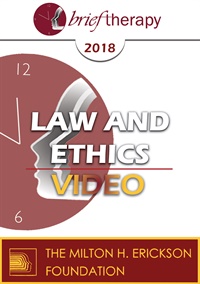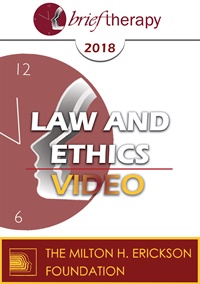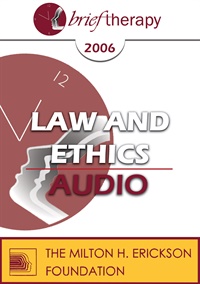
- Average Rating:
- Not yet rated
- Topic Areas:
- Law & Ethics | Therapist Development
- Categories:
- Brief Therapy Conference | Brief Therapy Conference 2006
- Faculty:
- A. Steven Frankel, PhD, JD, ABPP
- Duration:
- 3:34:49
- Format:
- Audio Only
- Original Program Date:
- Dec 06, 2006
- Short Description:
- The Laws and Ethics Workshop covers emerging legal and ethical issues for mental health practitioners of all disciplines. The four-hour program addresses issues including confidentiality and privilege, note-taking, record-keeping, coping with subpoenas, the impact of professional society ethical codes on regulation of mental health practice, liability exposure with suicidal patients, and recent developments in “Tarasoff situations.”
- Price:
- $15.00 - Base Price
Tags: Ethics Law Therapist Development
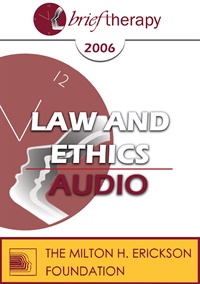
- Average Rating:
- Not yet rated
- Topic Areas:
- Law & Ethics | Therapist Development
- Categories:
- Brief Therapy Conference | Brief Therapy Conference 2006
- Faculty:
- A. Steven Frankel, PhD, JD, ABPP
- Duration:
- 1:47:57
- Format:
- Audio Only
- Original Program Date:
- Dec 06, 2006
- Short Description:
- This program focuses more closely on the needs of clinicians who fall into particularly high risk groups. Topics include confidentiality and privilege for children, coping with high-conflict divorce/custody families, the regressive impact of the regulatory environment on family therapy in particular, supervision/consultation issues that arise for professionals whose agency positions may include functions that conflict with ethical codes.
- Price:
- $15.00 - Base Price
Tags: Ethics Law Therapist Development
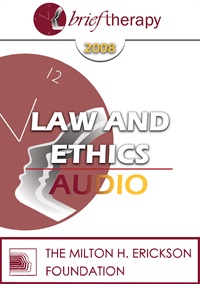
- Average Rating:
- Not yet rated
- Topic Areas:
- Law & Ethics | Therapist Development
- Categories:
- Brief Therapy Conference | Brief Therapy Conference 2008
- Faculty:
- A. Steven Frankel, PhD, JD, ABPP
- Duration:
- 3:23:59
- Format:
- Audio Only
- Original Program Date:
- Dec 10, 2008
- Short Description:
- The Law and Ethics Workshop covers emerging legal and ethical issues for mental health practitioners of all disciplines. The four-hour program addresses issues including confidentiality and privilege, note-taking, record-keeping, coping with subpoenas, the impact of professional society ethical codes on regulation of mental health practice, liability exposure with suicidal patients, and recent developments in “Tarasoff situations.”
- Price:
- $15.00 - Base Price
Tags: Ethics Law Therapist Development
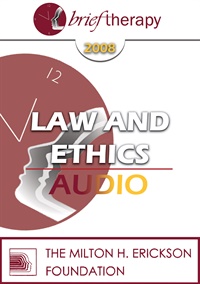
- Average Rating:
- Not yet rated
- Topic Areas:
- Law & Ethics | Therapist Development
- Categories:
- Brief Therapy Conference | Brief Therapy Conference 2008
- Faculty:
- A. Steven Frankel, PhD, JD, ABPP
- Duration:
- 1:38:17
- Format:
- Audio Only
- Original Program Date:
- Dec 10, 2008
- Short Description:
- This program focuses more closely on the needs of clinicians who fall into particularly high risk groups. Topics include confidentiality and privilege for children, coping with high-conflict divorce/custody families, the regressive impact of the regulatory environment on family therapy in particular, supervision/consultation issues that arise for professionals whose agency positions may include functions that conflict with ethical codes.
- Price:
- $15.00 - Base Price
Tags: Ethics Law Therapist Development
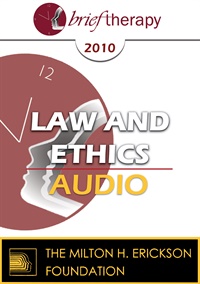
- Average Rating:
- Not yet rated
- Topic Areas:
- Law & Ethics | Therapist Development
- Categories:
- Brief Therapy Conference | Brief Therapy Conference 2010
- Faculty:
- A. Steven Frankel, PhD, JD, ABPP
- Duration:
- 2:51:47
- Format:
- Audio Only
- Original Program Date:
- Dec 08, 2010
- Short Description:
- This workshop reviews the areas of professional functions that have been most associated with regulatory problems for mental health professionals, including sexual and non-sexual boundary violations, “law-psych” interfaces, competence, “moral” offenses, licensing board and malpractice actions. The workshop covers causes for these problems and ways of avoiding them and/or managing them.
- Price:
- $15.00 - Base Price
Tags: Ethics Law Therapist Development
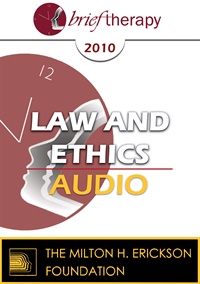
- Average Rating:
- Not yet rated
- Topic Areas:
- Law & Ethics | Therapist Development
- Categories:
- Brief Therapy Conference | Brief Therapy Conference 2010
- Faculty:
- A. Steven Frankel, PhD, JD, ABPP
- Duration:
- 2:02:36
- Format:
- Audio Only
- Original Program Date:
- Dec 08, 2010
- Short Description:
- This workshop reviews the areas of professional functions that have been most associated with regulatory problems for mental health professionals, including sexual and non-sexual boundary violations, “law-psych” interfaces, competence, “moral” offenses, licensing board and malpractice actions. The workshop covers causes for these problems and ways of avoiding them and/or managing them.
- Price:
- $15.00 - Base Price
Tags: Ethics Law Therapist Development
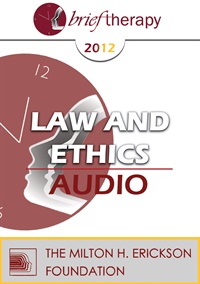
- Average Rating:
- Not yet rated
- Topic Areas:
- Law & Ethics | Therapist Development
- Categories:
- Brief Therapy Conference | Brief Therapy Conference 2012
- Faculty:
- A. Steven Frankel, PhD, JD, ABPP
- Duration:
- 3:26:23
- Format:
- Audio Only
- Original Program Date:
- Dec 05, 2012
- Short Description:
- This workshop in law, ethics and regulation focuses on three of the four most frequent causes for actions against mental health professionals, nationwide. Since the 2010-2011 law/ethics/regulation workshop focused primarily on boundary violations (including sexual contact between professional and patient/client), this 2012-2013 workshop focuses on incompetence, criminal convictions and cases involving high-conflict custody problems. The workshop emphasizes awareness and management of risk factors in the major areas of high risk practice via music videos illustrating the principles taught in the program.
- Price:
- $15.00 - Base Price
Tags: Ethics Law Therapist Development
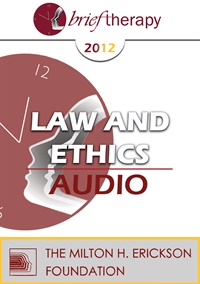
- Average Rating:
- Not yet rated
- Topic Areas:
- Law & Ethics | Therapist Development
- Categories:
- Brief Therapy Conference | Brief Therapy Conference 2012
- Faculty:
- A. Steven Frankel, PhD, JD, ABPP
- Duration:
- 1:49:32
- Format:
- Audio Only
- Original Program Date:
- Dec 05, 2012
- Short Description:
- This workshop in law, ethics and regulation focuses on three of the four most frequent causes for actions against mental health professionals, nationwide. Since the 2010-2011 law/ethics/regulation workshop focused primarily on boundary violations (including sexual contact between professional and patient/client), this 2012-2013 workshop focuses on incompetence, criminal convictions and cases involving high-conflict custody problems. The workshop emphasizes awareness and management of risk factors in the major areas of high risk practice via music videos illustrating the principles taught in the program. These include coping with negative publicity on the internet, the risks of “creative” techniques, riskier vs. safer models of intervention, coping with the need to “rescue” patients/clients, management of angry/dissatisfied patients/clients, and more.
- Price:
- $15.00 - Base Price
Tags: Ethics Law Therapist Development
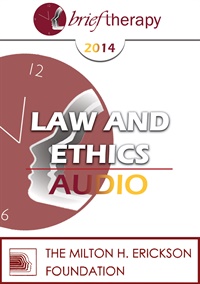
- Average Rating:
- Not yet rated
- Topic Areas:
- Law & Ethics | Therapist Development
- Categories:
- Brief Therapy Conference | Brief Therapy Conference 2014
- Faculty:
- A. Steven Frankel, PhD, JD, ABPP
- Duration:
- 5:39:27
- Format:
- Audio Only
- Original Program Date:
- Dec 15, 2014
- Short Description:
- This 6-hour program addresses the profound changes that are taking place in the health system in the U.S., the implications for mental health care, and, in turn, the implications for mental health care providers. We begin with a discussion of the role of the insurance industry in health care and how that role has expanded over the past 50-60 years, affecting the licensure and practices of mental health professionals.
- Price:
- $15.00 - Base Price
Tags: Ethics Law Therapist Development
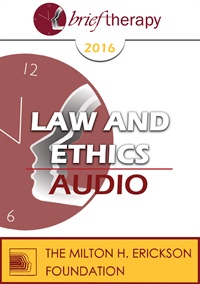
- Average Rating:
- Not yet rated
- Topic Areas:
- Law & Ethics | Therapist Development
- Categories:
- Brief Therapy Conference | Brief Therapy Conference 2016
- Faculty:
- A. Steven Frankel, PhD, JD, ABPP
- Duration:
- 2:06:29
- Format:
- Audio Only
- Original Program Date:
- Dec 07, 2016
- Short Description:
- “What goes around....” is a 6-hour law/ethics workshop and is focused on recent and emerging developments in law and ethics that will impact clinicians of all disciplines, starting with changes to child abuse reporting obligations, then moving to cover changes for custody evaluators, record-keeping and maintenance, emerging issues and risks regarding telehealth practice, updates on duties to inform and warn when violent behavior may occur, modifications of laws concerning “retirement” of professionals, receiving subpoenas, testifying in court, risk management for supervisors, suicide risk management, and “selected slippery slopes.”
- Price:
- $15.00 - Base Price
Tags: Ethics Law Therapist Development

- Average Rating:
- Not yet rated
- Topic Areas:
- Law & Ethics | Therapist Development
- Categories:
- Brief Therapy Conference | Brief Therapy Conference 2016
- Faculty:
- A. Steven Frankel, PhD, JD, ABPP
- Duration:
- 1:36:09
- Format:
- Audio Only
- Original Program Date:
- Dec 07, 2016
- Short Description:
- “What goes around....” is a 6-hour law/ethics workshop and is focused on recent and emerging developments in law and ethics that will impact clinicians of all disciplines, starting with changes to child abuse reporting obligations, then moving to cover changes for custody evaluators, record-keeping and maintenance, emerging issues and risks regarding telehealth practice, updates on duties to inform and warn when violent behavior may occur, modifications of laws concerning “retirement” of professionals, receiving subpoenas, testifying in court, risk management for supervisors, suicide risk management, and “selected slippery slopes.”
- Price:
- $15.00 - Base Price
Tags: Ethics Law Therapist Development
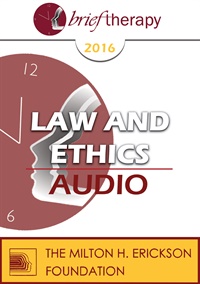
- Average Rating:
- Not yet rated
- Topic Areas:
- Law & Ethics | Therapist Development
- Categories:
- Brief Therapy Conference | Brief Therapy Conference 2016
- Faculty:
- A. Steven Frankel, PhD, JD, ABPP
- Duration:
- 1:54:50
- Format:
- Audio Only
- Original Program Date:
- Dec 07, 2016
- Short Description:
- “What goes around....” is a 6-hour law/ethics workshop and is focused on recent and emerging developments in law and ethics that will impact clinicians of all disciplines, starting with changes to child abuse reporting obligations, then moving to cover changes for custody evaluators, record-keeping and maintenance, emerging issues and risks regarding telehealth practice, updates on duties to inform and warn when violent behavior may occur, modifications of laws concerning “retirement” of professionals, receiving subpoenas, testifying in court, risk management for supervisors, suicide risk management, and “selected slippery slopes.”
- Price:
- $15.00 - Base Price
Tags: Ethics Law Therapist Development
- Average Rating:
- Not yet rated
- Topic Areas:
- Law & Ethics | Therapist Development
- Categories:
- Brief Therapy Conference | Brief Therapy Conference 2018
- Faculty:
- A. Steven Frankel, PhD, JD, ABPP
- Course Levels:
- Master Degree or Higher in Health-Related Field
- Duration:
- 3:14:00
- Format:
- Audio and Video
- Original Program Date:
- Dec 05, 2018
- Short Description:
- This presentation outlines key legal and ethical information pertaining to maintaining clinical records, privacy regulations and confidentiality, and is designed for early career through senior professionals. The program begins with a review of recently enacted or modified laws in the State of California, which have implications for all jurisdictions in the United States. The program then turns to issues concerning record retention from a legal liability viewpoint rather than the simple statements of how long records must be kept, and websites that provide helpful information about liability and risk management for any/all mental health clinicians, and then turns to an analysis of record keeping requirements.
- Price:
-
Sale is $29.00
price reduced from Base Price - $59.00
Tags: Ethics Law Therapist Development
- Average Rating:
- Not yet rated
- Topic Areas:
- Law & Ethics | Therapist Development
- Categories:
- Brief Therapy Conference | Brief Therapy Conference 2018
- Faculty:
- A. Steven Frankel, PhD, JD, ABPP
- Course Levels:
- Master Degree or Higher in Health-Related Field
- Duration:
- 1:51:51
- Format:
- Audio and Video
- Original Program Date:
- Dec 05, 2018
- Short Description:
- This presentation outlines key legal and ethical information pertaining to maintaining clinical records, privacy regulations and confidentiality, and is designed for early career through senior professionals. The program begins with a review of recently enacted or modified laws in the State of California, which have implications for all jurisdictions in the United States. The program then turns to issues concerning record retention from a legal liability viewpoint rather than the simple statements of how long records must be kept, and websites that provide helpful information about liability and risk management for any/all mental health clinicians, and then turns to an analysis of record keeping requirements.
- Price:
-
Sale is $29.00
price reduced from Base Price - $59.00
Tags: Therapist Development Ethics Law
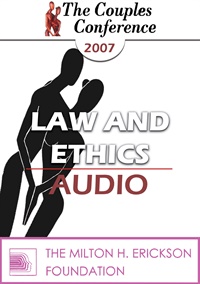
- Average Rating:
- Not yet rated
- Topic Areas:
- Law & Ethics | Therapist Development
- Categories:
- Couples Conference | Couples Conference 2007
- Faculty:
- A. Steven Frankel, PhD, JD, ABPP
- Duration:
- 3:39:34
- Format:
- Audio Only
- Original Program Date:
- Apr 26, 2007
- Short Description:
- The Law and Ethics Workshop covers emerging legal and ethical issues for mental health practitioners of all disciplines. The four-hour program addresses issues in- cluding confidentiality and privilege, note-taking, record-keeping, coping with sub- poenas, the impact of professional society ethical codes on regulation of mental health practice, liability exposure with suicidal patients, and recent developments in ''Tarasoff situations.''
- Price:
- $15.00 - Base Price
Tags: Ethics Law Therapist Development
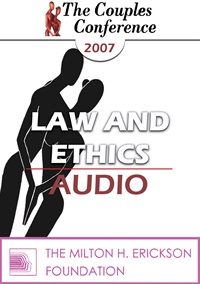
- Average Rating:
- Not yet rated
- Topic Areas:
- Law & Ethics | Therapist Development
- Categories:
- Couples Conference | Couples Conference 2007
- Faculty:
- A. Steven Frankel, PhD, JD, ABPP
- Duration:
- 1:41:00
- Format:
- Audio Only
- Original Program Date:
- Apr 26, 2007
- Short Description:
- This program focuses more closely on the needs of clinicians who fall into particularly high risk groups. Topics include confidentiality and privilege for children, coping with high-conflict divorce/custody families, the regressive impact of the regulatory environment on family therapy in particular, supervision/consultation issues that arise for professionals whose agency positions may include functions that conflict with ethical codes.
- Price:
- $15.00 - Base Price
Tags: Ethics Law Therapist Development
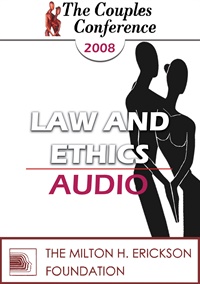
- Average Rating:
- Not yet rated
- Topic Areas:
- Law & Ethics | Therapist Development
- Categories:
- Couples Conference | Couples Conference 2008
- Faculty:
- A. Steven Frankel, PhD, JD, ABPP
- Duration:
- 3:27:00
- Format:
- Audio Only
- Original Program Date:
- Apr 24, 2008
- Short Description:
- The Law and Ethics Workshop covers emerging legal and ethical issues for mental health practitioners of all disciplines. The four-hour program addresses issues including confidentiality and privilege, note-taking, record-keeping, coping with subpoenas, the impact of professional society ethical codes on regulation of mental health practice, liability exposure with suicidal patients, and recent developments in “Tarasoff situations.”
- Price:
- $15.00 - Base Price
Tags: Ethics Law Therapist Development
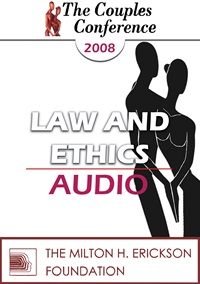
- Average Rating:
- Not yet rated
- Topic Areas:
- Law & Ethics | Therapist Development
- Categories:
- Couples Conference | Couples Conference 2008
- Faculty:
- A. Steven Frankel, PhD, JD, ABPP
- Duration:
- 1:48:58
- Format:
- Audio Only
- Original Program Date:
- Apr 24, 2008
- Short Description:
- This program focuses more closely on the needs of clinicians who fall into particularly high risk groups. Topics include confidentiality and privilege for children, coping with high-conflict divorce/custody families, the regressive impact of the regulatory environment on family therapy in particular, supervision/consultation issues that arise for professionals whose agency positions may include functions that conflict with ethical codes.
- Price:
- $15.00 - Base Price
Tags: Ethics Law Therapist Development
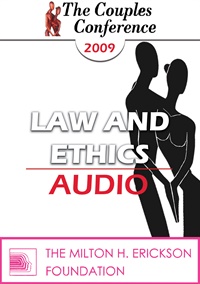
- Average Rating:
- Not yet rated
- Topic Areas:
- Law & Ethics | Therapist Development
- Categories:
- Couples Conference | Couples Conference 2009
- Faculty:
- A. Steven Frankel, PhD, JD, ABPP
- Duration:
- 3:34:47
- Format:
- Audio Only
- Original Program Date:
- Apr 30, 2009
- Short Description:
- The Law and Ethics Workshop covers emerging legal and ethical issues for mental health practitioners of all disciplines. The four-hour program addresses issues including confidentiali- ty and privilege, note-taking, record-keeping, coping with subpoenas, the impact of professional society ethical codes on regulation of mental health practice, liability exposure with suicidal patients, and recent developments in “Tarasoff situations.”
- Price:
- $15.00 - Base Price
Tags: Ethics Law Therapist Development
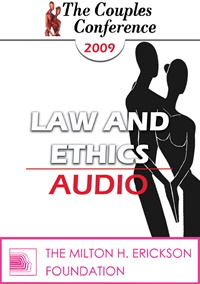
- Average Rating:
- Not yet rated
- Topic Areas:
- Law & Ethics | Therapist Development
- Categories:
- Couples Conference | Couples Conference 2009
- Faculty:
- A. Steven Frankel, PhD, JD, ABPP
- Duration:
- 1:45:43
- Format:
- Audio Only
- Original Program Date:
- Apr 30, 2009
- Short Description:
- This program focuses more closely on the needs of clinicians who fall into particularly high risk groups. Topics include confidentiality and privilege for children, coping with high-conflict divorce/custody families, the regressive impact of the regulatory environment on family therapy in particular, supervision/ consultation issues that arise for professionals whose agency positions may include functions that conflict with ethical codes.
- Price:
- $15.00 - Base Price
Tags: Ethics Law Therapist Development
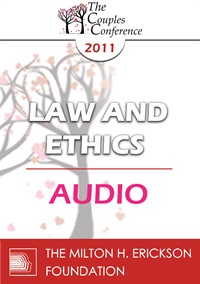
- Average Rating:
- Not yet rated
- Topic Areas:
- Law & Ethics | Therapist Development
- Categories:
- Couples Conference | Couples Conference 2011
- Faculty:
- A. Steven Frankel, PhD, JD, ABPP
- Duration:
- 3:39:29
- Format:
- Audio Only
- Original Program Date:
- Mar 31, 2011
- Short Description:
- This workshop reviews the areas of professional functions that have been most associated with regulatory problems for mental health professionals, including sexual and nonsexual boundary violations, “law-psych” interfaces, competence, “moral” offenses, licensing board and malpractice actions. The workshop covers causes for these problems and ways of avoiding them and/or managing them.
- Price:
- $15.00 - Base Price
Tags: Ethics Law Therapist Development
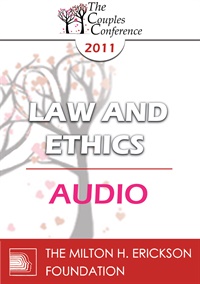
- Average Rating:
- Not yet rated
- Topic Areas:
- Law & Ethics | Therapist Development
- Categories:
- Couples Conference | Couples Conference 2011
- Faculty:
- A. Steven Frankel, PhD, JD, ABPP
- Duration:
- 1:54:43
- Format:
- Audio Only
- Original Program Date:
- Mar 31, 2011
- Short Description:
- This workshop reviews the areas of professional functions that have been most associated with regulatory problems for mental health professionals, including sexual and nonsexual boundary violations, “law-psych” interfaces, competence, “moral” offenses, licensing board and malpractice actions. The workshop covers causes for these problems and ways of avoiding them and/or managing them.
- Price:
- $15.00 - Base Price
Tags: Ethics Law Therapist Development
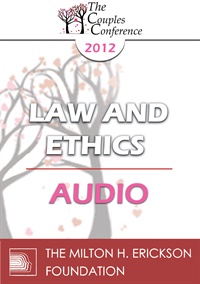
- Average Rating:
- Not yet rated
- Topic Areas:
- Law & Ethics | Therapist Development
- Categories:
- Couples Conference | Couples Conference 2012
- Faculty:
- A. Steven Frankel, PhD, JD, ABPP
- Duration:
- 3:41:58
- Format:
- Audio Only
- Original Program Date:
- Apr 26, 2012
- Short Description:
- This workshop in law, ethics and regulation focuses on three of the four most frequent causes for actions against mental health professionals, nationwide. Since the 2010-2011 law/ethics/regulation workshop focused primarily on boundary violations (including sexual contact between professional and patient/client), this 2012 -2013 workshop focuses on incompetence, criminal convictions and cases involving high conflict custody problems.
- Price:
- $15.00 - Base Price
Tags: Ethics Law Therapist Development

- Average Rating:
- Not yet rated
- Topic Areas:
- Law & Ethics | Therapist Development
- Categories:
- Couples Conference | Couples Conference 2012
- Faculty:
- A. Steven Frankel, PhD, JD, ABPP
- Duration:
- 1:56:01
- Format:
- Audio Only
- Original Program Date:
- Apr 26, 2012
- Short Description:
- This workshop in law, ethics and regulation focuses on three of the four most frequent causes for actions against mental health professionals, nationwide. Since the 2010-2011 law/ethics/regulation workshop focused primarily on boundary violations (including sexual contact between professional and patient/client), this 2012 -2013 workshop focuses on incompetence, criminal convictions and cases involving high conflict custody problems.
- Price:
- $15.00 - Base Price
Tags: Ethics Law Therapist Development
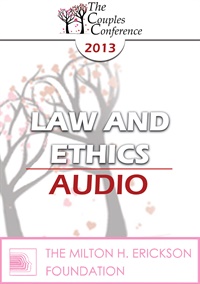
- Average Rating:
- Not yet rated
- Topic Areas:
- Law & Ethics | Therapist Development
- Categories:
- Couples Conference | Couples Conference 2013
- Faculty:
- A. Steven Frankel, PhD, JD, ABPP
- Duration:
- 3:11:12
- Format:
- Audio Only
- Original Program Date:
- Apr 18, 2013
- Short Description:
- This workshop in law, ethics and regulation focuses on three of the four most frequent causes for actions against mental health professionals, nationwide. Since the 2010-2011 law/ethics/regulation workshop focused primarily on boundary violations (including sexual contact between professional and patient/client), this 2012-2013 workshop focuses on incompetence, criminal convictions and cases involving high conflict custody problems. The workshop emphasizes awareness and management of risk factors in the major areas of high risk practice via music videos illustrating the principles taught in the program.
- Price:
- $15.00 - Base Price
Tags: Ethics Law Therapist Development


